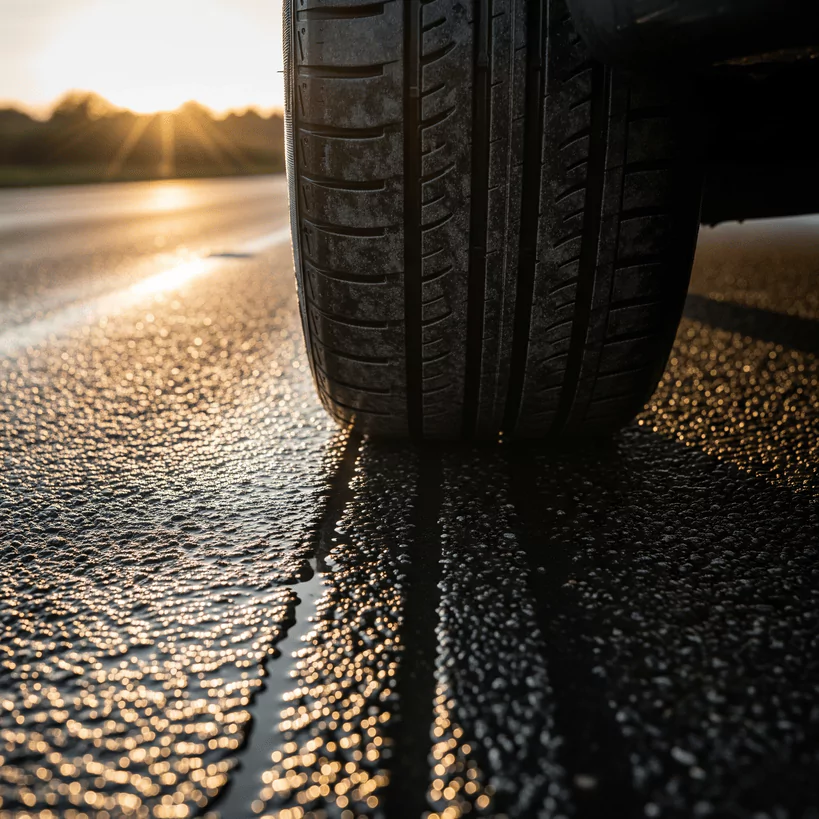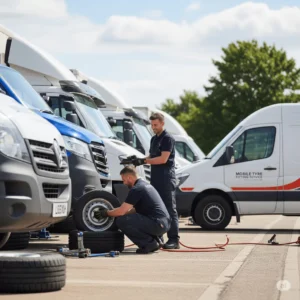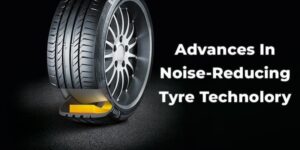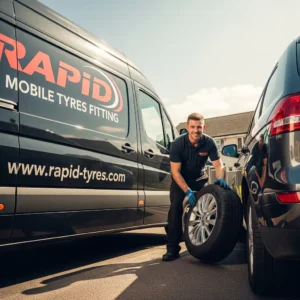Have you ever been driving down a normal UK road, maybe with light rain falling, and not given the four pieces of rubber that connect your car to the road a second thought? Those tires, which you might not think are very important, are actually very important to your safety. Worn tires, on the other hand, turn this important link into a major danger—a silent threat that many people live with without realising it. But there’s an easy way to stay safe and calm: Rapid Mobile Tyres is your quick and reliable partner for all your tyre needs across the UK. We’re here to show you the secret dangers of worn tires, go over the legal basics, and show you how our easy-to-use service keeps you safe on every trip.
More Than Just Rubber: Understanding the Critical Role of Your Tyres
When you think of your car, you probably picture the engine, the sleek body, or the nice seats inside. But in fact, those four small contact patches where your tires meet the road are the most important parts. They’re what keep you safe and in control. You can’t move or stop without them, and their state determines everything from how quickly you can stop to how well you can handle a bend.
Your Only Contact with the Road: Grip and Control
It wouldn’t be smart to try to run on ice in shoes with smooth soles, would it? The way your tires work is eerily similar, but they’re very complex. What’s cut into the surface of your tyre, called the tread, isn’t just for looks. They were carefully made to give you the best grip in a wide range of circumstances. When the roads are dry, the tread blocks grip the surface, making it easy to turn and speed up. When it starts to rain in Britain, those lines become very important channels that move water out of the way so that the rubber stays in contact with the road and dangerous aquaplaning doesn’t happen. Certain tire compounds and tread patterns are made to keep their flexibility and grip even when it’s cold outside.
However, as these important tread patterns wear down, they become much less effective at doing these things. This has a direct effect on your stopping distance, which is the distance and time it takes for your car to stop. If your tires don’t have as much grip, your car will fall farther, which could turn a close call into a crash. Similarly, your steering response slows down and becomes less accurate, which makes it harder to control your car, especially when you need to respond quickly to dangers. If you tried to walk on a shiny, wet floor in those old, worn-out shoes, you’d slip and slide all the time, making it more likely that you’d fall. Yes, that’s exactly what happens when your tires loose their grip.
Beyond Grip: Stability and Comfort
Your tires’ main job is to grip and control the road, but they also play a big part in other parts of your driving experience, like how stable and comfortable you are. Your tires are the first thing that will protect you from the UK’s often uneven road conditions. When you drive over bumps, holes, and other imperfections in the road, the air in your tires and the flexibility of their sides act as a cushion. This not only makes the ride more comfortable for you and your guests, but it also keeps the suspension system of your car from getting too worn out.
In addition, the state of your tires is very important for how stable your car is overall, especially when going fast or around corners. Tires that are properly inflated and have enough tread depth provide a stable base for your car, so it acts predictably to steering inputs. Worn or underinflated tires, on the other hand, can make the car feel “squirming” or unstable, which makes it feel less stable and raises the risk of losing control, especially when making quick turns or when the weather is bad. This is why keeping the right tyre pressure and tread depth is important for more than just stopping power. It’s also important for a safe and stable driving experience.
The Perilous Path: Explaining the Risks of Driving on Worn or Damaged Tyres
The majority of us drive every day, and most of the time, we don’t fully think about the risks involved. When your tires are worn or broken, though, those risks go up a lot. Everyday, you might not notice the slow decline, but things can get very bad when things go wrong. Not just getting a MOT; it’s about your life and the lives of other people on the road.
Reduced Braking Performance: When Every Inch Counts
What is the main danger of worn tyres? Worn tires are mostly dangerous because they make it much harder to stop, which increases the chance of an accident.
Let’s say you’re going on the M25 during rush hour. The traffic in front of me stops all of a sudden. In an instant, you slam on the brakes, but if your tires are old, your car will keep sliding for a few more feet or even meters. That difference, which might not seem like much, could be the difference between a safe stop and a terrible rear-end accident. A tyre with 3mm of tread can stop a 70mph car about 2.5 car lengths faster than a tyre with the required minimum of 1.6mm of tread on a dry road. When rain comes into the picture, the change is even more shocking. If you want to escape an accident, every inch and millisecond really does matter.
Aquaplaning: Losing Control in the Wet
Sudden loss of control is one of the scariest things that can happen to a driver, and aquaplaning is a big reason for that, especially on British roads that get a lot of rain. Aquaplaning happens when water forms between your tires and the road, making it impossible for your car to stay on the road. Your tires don’t really grip the road; they’re more like speedboats that skim on water.
Aquaplaning is more likely to happen on worn tires because their shallow tread grooves can’t successfully move water away from the contact patch. The deeper lines on new tires move water around more efficiently, like tiny drainage systems. If these gaps get worn down, water can’t go anywhere, and the tyre lifts off the road. This suddenly and completely takes away your ability to steer and brake, leaving you feeling useless as your car slides around without your control. It’s a really scary situation that you can usually avoid by making sure your tires have enough tread depth.
Increased Risk of Punctures and Blowouts: A Sudden Catastrophe
In addition to slowly losing their function, worn or damaged tires are much more likely to fail suddenly and badly. The rubber gets thinner and less flexible as the tread wears down. This makes the wheel much more likely to get a hole from things like nails, glass or sharp stones that you might find on the road. What might not be a big deal for a healthy tyre could become a hole that quickly deflates an old one.
The bigger chance of a blowout is even more dangerous. A blowout happens when a tyre quickly loses all of its air pressure, usually with a loud bang. This can happen at high speeds and make it very hard to control the vehicle. Sidewalls that are worn down (the side of the tire) are more likely to suddenly fail. These can be damaged by curbs or cracks. British breakdown services say that problems with tires are one of the main reasons why cars break down on the side of the road. Punctures and blowouts are two of the most common types of problems. Don’t let a quick tyre failure that could have been avoided force you to stop or even end your trip.
Legal Ramifications and Insurance Woes
In the UK, it is not only illegal but also very dangerous to drive on tires that are worn or broken. A fine of up to £2,500 and three penalty points per tire could be given to you if you are caught driving with tires that don’t have the legal minimum tread depth (1.6 mm across the centre three-quarters of the tread around the whole circumference) or that have a lot of damage. Yes, that means that if all four of your tires are illegal, you could get a £10,000 fine and 12 penalty points, which is enough to get you banned from driving.
You will still have to pay money and face legal trouble after that. If you have an accident and it turns out that your tires aren’t safe for the road, your car insurance might not cover you anymore. This means that your insurance company might not pay for the damage; instead, you could be responsible for tens of thousands of pounds in repairs, hospital bills, and claims from other people. For your money or your peace of mind, it’s just not worth the risk.
The Law and Your Tyres: Importance of Legal Tread Depth
Aside from the obvious safety concerns, there are strict rules about how tires should be maintained in the UK. It’s not enough to just know these rules to escape fines and points; you need to know them to make sure your car is really roadworthy and safe for every trip. It’s not a defence to not know the rules, especially when lives are at stake.
What is the Legal Tread Depth in the UK?
What is the legal tyre tread depth in the UK? In the UK, cars must have at least 1.6 mm of tread depth across the middle three-quarters of the tread around the whole circle. Not just any part of the tire, but the key grooves need to be measured this way.
It’s simple and easy to check your tyre tread depth, and every driver should do it often. You can use a special tread depth measure, which is easy to find and doesn’t cost much. Just put the measure into the tire’s main grooves several times, both around the tire’s circumference and across its width. The reading will tell you how much tread depth is left.
On the other hand, all tires made for sale in the UK have tread wear signs built in. These are small raised bars that are spaced out regularly inside the main lines of the tire. If the tread wears down to the same level as these lines, your tyre has hit the legal minimum depth and needs to be replaced right away. If these lights are flush with the tire’s surface, it’s time for a new set.
The 1.6mm Myth vs. Safety Reality
The legal minimum is 1.6mm, but it’s important to remember that it’s just that: a minimum. It’s not the same thing as having tires that are legal and having tires that are safe, especially in normal British weather.
A lot of studies, including ones by tire companies and road safety groups, have shown that as tread depth gets closer to 3mm, tire performance, especially stopping distances in wet circumstances, gets much worse. When it’s wet, a tyre with 3mm of tread will do much better than one with 1.6mm. This is because the 1.6mm gaps are much less good at spreading water, which makes the tire much more likely to aquaplane and lose its grip.
So, based on what experts say, you should definitely get new tires before they hit the legal minimum of 1.6mm. It’s best to get new tires when the tread level is about 2mm to 3mm, especially if you drive a lot in the rain or at high speeds. Taking this preventative step will greatly increase your safety margin, giving you more grip, better stopping power, and more peace of mind on the road. Don’t wait until your tires are unsafe to legally replace them; instead, put your safety first and replace them when they start to lose their grip.
Rapid Mobile Tyres: Your Roadside Guardian for Tyre Safety in the UK
Convenience is king in today’s fast-paced world, especially when problems come up out of the blue. A flat tyre or finding tread that is too worn down to drive on can really mess up your day, but it doesn’t have to be that way. This is where Rapid Mobile Tyres comes in. They change the way drivers in the UK take care of their tyre needs, giving you more control over safety and ease.
Convenience at Your Fingertips: The Mobile Tyre Fitting Revolution
No longer do you have to limp to the garage on a flat tire, wait in line, or try to fit a tire appointment into a plan that is already full. Because of the mobile tyre fitting change, the garage can come to you whenever you need them to. Rapid Mobile Tyres specialises in emergency and 24 hour mobile tyre fitting because they know that tyre problems don’t happen during business hours.
The benefits are truly transformative:
No more garage visits
Avoid wasting time and trouble by not going to a tire shop.
Fitting at your location
You can use it whether you're at home, at work, or on the side of the road.
Ultimate flexibility
Need a Mobile Tyre Fitting in Bristol the Same Day? Or maybe you're in another busy place in the UK and need help right away? Our service is meant to get you back on the road quickly and safely so that your day doesn't get too messed up. It's about getting your tyre problem fixed the way you want, not the way we want.
Expertise You Can Trust: How Rapid Mobile Tyres Ensures Your Tyres Are Safe and Roadworthy
When you pick a mobile service, you don’t have to give up quality or experience. When you work with Rapid Mobile Tyres, you get access to highly trained professionals who care about your safety. Our dedication goes beyond just changing a tyre; it includes a full inspection and a perfect fit.
When our mechanics get there, they don’t just change a tyre. During their thorough inspection, they look for:
Overall state of the tire, including signs of uneven wear and the strength of the sidewalls.
- How much tread depth is left on the tire.
- Any cuts or other damage that could be fixed.
- Tyre pressure and wheel balance in general.
We promise to only put on high-quality, road-worthy tires that meet or go beyond UK safety standards. This way, you can be sure that your tires will work well and last a long time. Our mobile tire fitting fleet has the most up-to-date tools and a large selection of tires to handle almost any car or situation. This means that we can quickly fit your tires whenever you call. If your tires are damaged enough, our mobile tyre repair service can often save you money over a full replacement, giving you a safe and quick fix right where you are. Because we know what we’re doing, every tyre we put on or fix will make your car safer.
Beyond Emergencies: Proactive Tyre Replacement Importance
We’re here for those sudden situations, but we also strongly encourage you to be proactive about maintaining your tires. Don’t put off getting new tires until they are worn out, broken, or against the law. Checking your tyre pressure and tread level on a regular basis can help you find problems before they get too bad.
Rapid Mobile Tyres should not only be your go-to company in an emergency, but also your long-term partner in tyre upkeep. If you notice that your tyre tread depth is getting close to the recommended 2-3 mm range or if you see any damage that worries you, please get in touch with us for help or to set up a convenient mobile fitting. Being cautious will make sure that you always have safe, well-maintained tires on your car. This will give you peace of mind and help make the roads in the UK safer for everyone.
Conclusion
In the end, the state of your tires is not a small matter; it has a direct effect on your safety, the safety of your passengers, and the safety of everyone else on the road. We’ve already talked about how driving on old or damaged tires makes it much harder to stop, raises the risk of scary aquaplaning accidents, and leaves you open to sudden, dangerous blowouts. In addition to the immediate risks, there are serious legal and financial consequences, such as large fines and the possibility that your car insurance will not cover you. This makes it an absolute must for all UK drivers to keep their tires in good shape.
Do not put your life at risk. Call Rapid Mobile Tyres right away if you’re worried about your tires or need a quick and reliable repair! When you need us, our expert mobile tyre fitting service will come to you and fix the problem, getting you back on the road safely and legally with as little trouble as possible.
Don’t forget that maintaining your tires isn’t something you should only do when your MOT is due. That’s something you have to do all the time to make sure you’re safe on every trip. Remember to be careful, have your tires checked often, and trust Rapid Mobile Tyres to help you stay safe on the UK’s roads.




